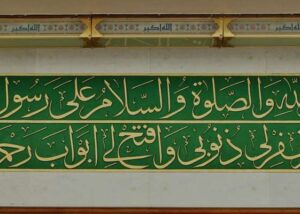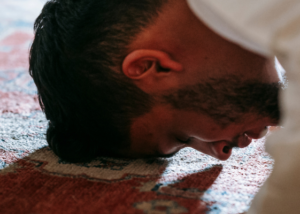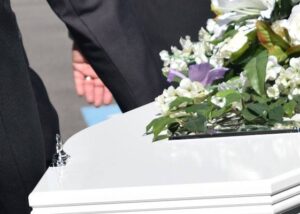How strong is the Hadith about not praying Janazah in a Masjid?
Quran
Hadith
Islamic Text
The Hadith about not praying Janazah in a Masjid is weak.
حَدَّثَنَا حَجَّاجٌ، وَيَزِيدُ بْنُ هَارُونَ، قَالَا: أَخْبَرَنَا ابْنُ أَبِي ذِئْبٍ، عَنْ صَالِحٍ، مَوْلَى التَّوْأَمَةِ، عَنْ أَبِي هُرَيْرَةَ، قَالَ: قَالَ رَسُولُ اللهِ صَلَّى اللهُ عَلَيْهِ وَسَلَّمَ: مَنْ صَلَّى عَلَى جَنَازَةٍ فِي الْمَسْجِدِ، فَلَا شَيْءَ لَهُ
(Sayidina) Abu Hurairah (May Allah Most High be pleased with him) said, that the Prophet ﷺ said, ‘If someone prays over the dead in the Masjid, then there is nothing for him.’ (Ahmad 9865, Weak).
The Hadith narration above, about not praying Janazah in a Masjid, is from the Musnad of Imam Ahmad. Imam Abu Dawood (3191) and Imam Ibn Maja (1517) both have similar narrations. However, they all have Salih Mowlaa al-Towamah in the chain. Salih is a weak narrator. Therefore, the Hadith is weak.
قَالَ أَحْمَدُ بْنُ حَنْبَلٍ هَذَا حَدِيثٌ ضَعِيفٌ تَفَرَّدَ بِهِ صَالِحٌ مَوْلَى التَّوْأَمَةِ وَهُوَ ضَعِيفٌ. (شرح صحيح مسلم)
(Imam) Ahmad bin Hanbal said, this Hadith is weak. Salih Mowlaa al-Towamah was alone in narrating it and he is weak. (Imam al-Nawawi, Sharh Sahih Muslim).
مَنْ صَلَّى عَلَى جَنَازَةٍ فِي الْمَسْجِدِ فَلَا شَيْءَ لَهُ. فَضَعِيفٌ بِاتِّفَاقِ الْمُحَدِّثِينَ. (مرقاة المفاتيح شرح مشكاة المصابيح)
‘If someone prays over the dead in the Masjid, then there is nothing for him.’ This is weak by the agreement of the Hadith scholars. (Imam Ali al-Qari, Mirqaat al-Mafateeh).
Weak Hadith narrations are not to be treated in the same manner as fabricated Hadith, and therefore are not absolutely rejected. Rather weak Hadith are used for certain aspects of the Deen.
وَمَنْ نُقِلَ عَنْهُ ذَلِكَ: ابْنُ حَنْبَلٍ، وَابْنُ مَهْدِيٍّ، وَابْنُ الْمُبَارَكِ، قَالُوا: إِذَا رُوِّينَا فِي الْحَلَالِ وَالْحَرَامِ شَدَّدْنَا، وَإِذَا رُوِّينَا فِي الْفَضَائِلِ وَنَحْوِهَا تَسَاهَلْنَا.
تَنْبِيهٌ: لَمْ يَذْكُرِ ابْنُ الصَّلَاحِ وَالْمُصَنِّفُ هُنَا، وَفِي سَائِرِ كُتُبِهِ لِمَا ذُكِرَ سِوَى هَذَا الشَّرْطِ، وَهُوَ كَوْنُهُ فِي الْفَضَائِلِ وَنَحْوِهَا، وَذَكَرَ شَيْخُ الْإِسْلَامِ لَهُ ثَلَاثَةَ شُرُوطٍ:
أَحَدُهَا: أَنْ يَكُونَ الضَّعْفُ غَيْرَ شَدِيدٍ، فَيَخْرُجُ مَنِ انْفَرَدَ مِنَ الْكَذَّابِينَ وَالْمُتَّهَمِينَ بِالْكَذِبِ، وَمَنْ فَحُشَ غَلَطُهُ، نَقَلَ الْعَلَائِيُّ الِاتِّفَاقَ عَلَيْهِ.
الثَّانِي: أَنْ يَنْدَرِجَ تَحْتَ أَصْلٍ مَعْمُولٍ بِهِ.
الثَّالِثُ: أَنْ لَا يُعْتَقَدَ عِنْدَ الْعَمَلِ بِهِ ثُبُوتُهُ، بَلْ يُعْتَقَدُ الِاحْتِيَاطُ.
It has been narrated from Ibn Hanbal, Ibn Mahdi, Ibn Mubarak, who all said, if Hadith regarding Halal and Haram are narrated then we are strict. And if Hadith regarding the virtues of deeds and the like are narrated then we are lenient.
Important Note: Ibn Salaah and the author did not mention here or in any of their books, any conditions except for this one. Namely, it (the weak Hadith) being used for the virtues of deeds. Shaykh al-Islam mentioned three conditions for it:
Firstly, the weakness cannot be severe, this excludes narrations that have liars in them, or narrations of those accused of lying, and those who make grave errors when narrating, al-Alai narrated agreement upon this condition.
Secondly, it must be in line with an established, acted upon, teaching (of the Deen).
Thirdly, when acting upon it (the weak Hadith) one cannot believe it to be a sound narration, rather one must keep in mind caution. (Imam al-Sayuti, Tadreeb al-Rawi volume 1 page 351 Dar Taybah).
In light of this, the Hadith about not praying Janazah in a Masjid, is not to be rejected. Rather it can be used to consider Janazah in a Masjid to be Makruh, but not Haram. This is the position of the Hanafi Madhab.
And Allah Most High Know Best.
– Answered by Shaykh Noorud-deen Rashid (01.03.2022)
See also:
See also (video):






